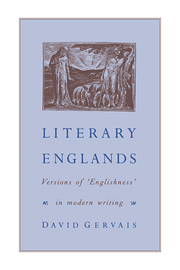Book contents
- Frontmatter
- Contents
- Preface
- Acknowledgements
- Abbreviations
- 1 The nineteenth century: pastoral versions of England
- 2 Edward Thomas: An England of ‘holes and corners’
- 3 Forster and Lawrence: exiles in the homeland
- 4 Late witness: George Sturt and village England
- 5 Contending Englands: F. R. Leavis and T. S. Eliot
- 6 Englands within England: Waugh and Orwell
- 7 Larkin, Betjeman and the aftermath of ‘England’
- 8 Geoffrey Hill and the ‘floating of nostalgia’
- Afterword: A homemade past
- Index
6 - Englands within England: Waugh and Orwell
Published online by Cambridge University Press: 15 October 2009
- Frontmatter
- Contents
- Preface
- Acknowledgements
- Abbreviations
- 1 The nineteenth century: pastoral versions of England
- 2 Edward Thomas: An England of ‘holes and corners’
- 3 Forster and Lawrence: exiles in the homeland
- 4 Late witness: George Sturt and village England
- 5 Contending Englands: F. R. Leavis and T. S. Eliot
- 6 Englands within England: Waugh and Orwell
- 7 Larkin, Betjeman and the aftermath of ‘England’
- 8 Geoffrey Hill and the ‘floating of nostalgia’
- Afterword: A homemade past
- Index
Summary
The ‘thirties’ is the age not of the thatched cottage but of the Shell Guide and the Greenline bus. For the first time, writers see the country as truly contemporary rather than timeless. Orwell's Coming Up for Air comes to mind, though it was a close contemporary of John Cowper Powys's A Glastonbury Romance which mythologises England all over again, as if Drayton had never gone out of fashion.
Such juxtapositions are to the point – nothing puts one off ‘the Thirties’ more than the notion of them as a ‘decade’ in which writers merged in monolithic orthodoxy. If there was any representatively ‘thirties’ view of England, it was surely the upshot of coexistent but contradictory Englands. After all, people had believed no less in Edwardian England because Kipling and Elgar and Edward Thomas had each imagined it differently. One expects an imperial nation to be multifarious. In fact, what the different available versions of England had in common was probably their underlying sense of loss and fragmentation, the modern fear that ‘the centre cannot hold’: the very breaking down of national identity turns out to be itself a kind of cultural cement. If we substitute other names for the cliché ones evoked by such phrases as ‘The Age of Auden’ – Lewis Grassic Gibbon, say, or Leavis or the Powys brothers – the age will seem to undermine its own stereotypes.
- Type
- Chapter
- Information
- Literary EnglandsVersions of 'Englishness' in Modern Writing, pp. 156 - 184Publisher: Cambridge University PressPrint publication year: 1993



